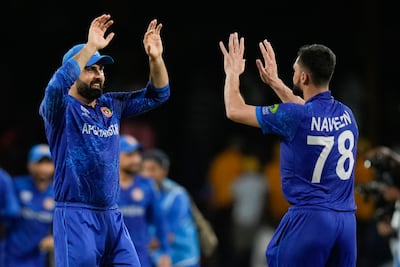It is a photograph to remember – hundreds of Afghans crowding the streets of Jalalabad on Tuesday, transfixed by coverage of their country’s cricket team on the way to make history by reaching the semi-finals of the T20 World Cup for the first time courtesy of a win over Bangladesh. For a country too often depicted through stereotypes – gun-toting Taliban fighters or impoverished cities and villages – this was a view of the real Afghanistan: a diverse country proud of its identity and achievements.
And what an achievement this has been; a team of cricketers scattered from their homeland by war, taking on the world’s best and winning. Afghanistan have in recent years performed consistently well at global competitions, but their defeat of cricketing powerhouse Australia on Sunday and their semi-final spot have a significance that goes well beyond sport, having been forged years before in the fires of adversity.
The National this week reported how, in May 2003, just after Australia had won the Cricket World Cup for the third time, a trial was held in Kabul to set up an Afghan team. The aspiring players were newly returned from exile in Pakistan, where they had learnt their hosts’ favourite sport while living in refugee camps. In subsequent years, the side established itself as a cricketing force in a process that was collaborative, with significant assistance coming from countries such as England, India and the UAE.

Indeed, many in the Emirates have been cheering on the Afghans. This is unsurprising, given the deep ties that have been built between the cricketing fraternities of each country. Several Afghan players live in the UAE; Sharjah Cricket Academy has in excess of 40 registered players of Afghan origin; Abu Dhabi has hosted many of the side’s international matches; and Dubai has been the scene of many of their most important successes, such as the side’s first qualification for a major tournament in 2010. The UAE is also home to a large Afghan community, in the hundreds of thousands.
Regardless of how this team’s journey ends – they will take on South Africa on Thursday for a spot in the final – this has already been a win for the Afghan people, who for too long have had precious little to cheer about. This is not to suggest that a sporting victory can make up for years of bitter conflict and turmoil, or solve the devastating economic crisis gripping the country. On Sunday, the UN will host a third conference in Doha aimed at tackling some of the nation's many remaining challenges: international restrictions on Afghanistan’s banking and financial systems that frustrate hopes of an economic recovery, the continuing threat from extremist groups and the persistent problem of drug trafficking.
The fate of the Afghan women’s team is an additional reminder that all is not well in the country. After the Taliban’s return to power in 2021, the new regime banned the side from playing as part of the militants’ general repression of women. Women and girls continue to be denied the right to take part not only in sports, but in education and the workplace – an intolerable situation that must change.
Despite such unfair policies, one should not dismiss sport’s power to lift people and restore national pride. The Atlas Lions carried the hopes of many in the Arab world with their spectacular run at the 2022 World Cup in Qatar, and trailblazing Tunisian tennis star Ons Jabeur has been an inspirational figure for countless young people in North Africa and further afield. For Afghanistan’s cricketers, this is a moment to be savoured but also built upon, dispelling cliches about their homeland and showing that nothing is impossible.


